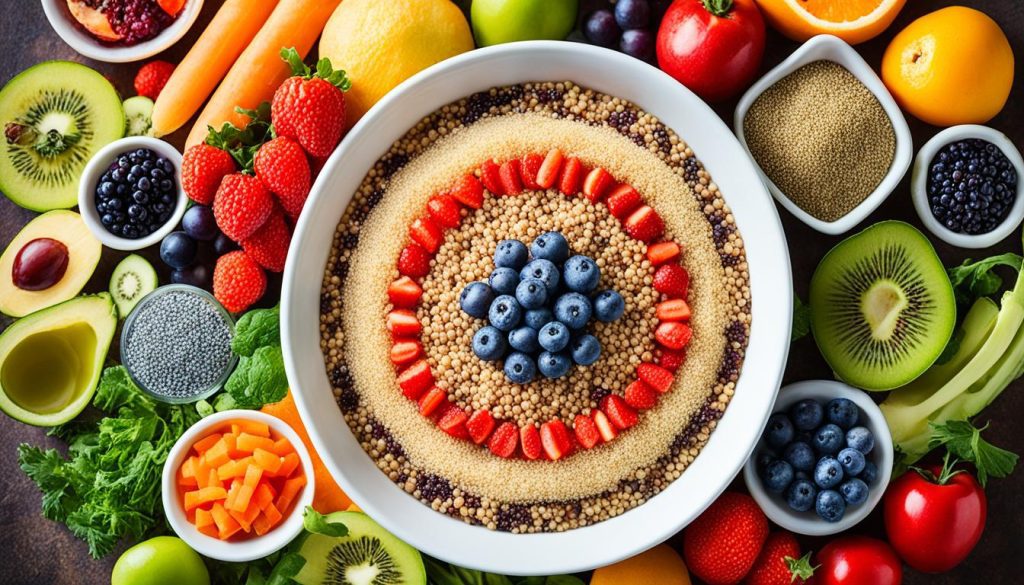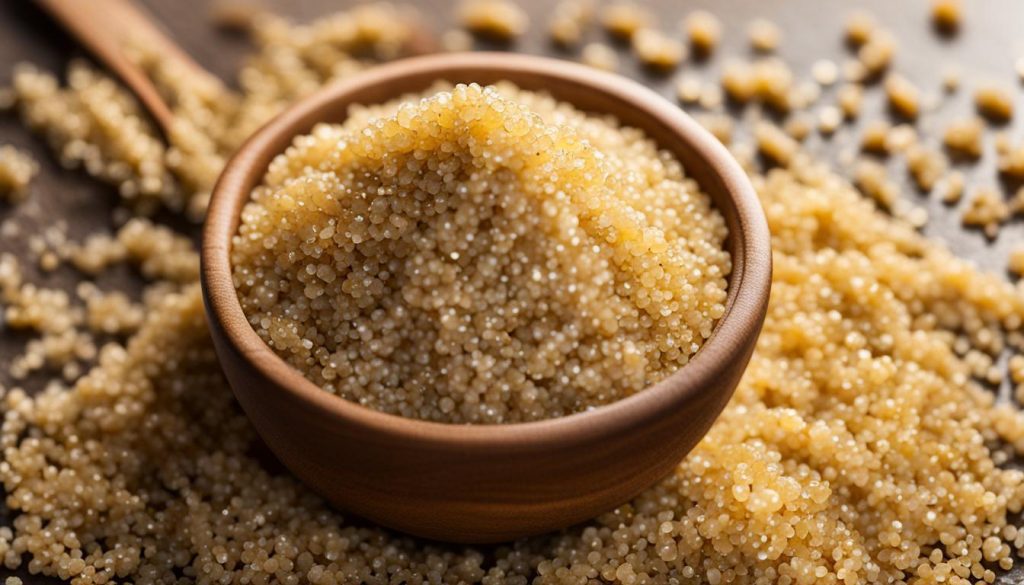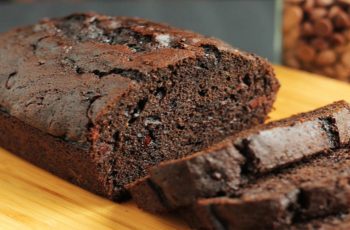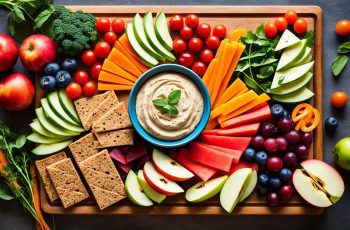Quinoa, a small round seed, has been consumed for thousands of years in South America and has become a staple grain in the US and other Western countries. It is loaded with health benefits due to its high nutrient content. One cup of cooked quinoa contains 222 calories, 8 grams of protein, and 5.2 grams of fiber. It is also a good source of thiamin, riboflavin, vitamin B6, folate, iron, magnesium, phosphorus, and manganese.
Health Benefits of Organic Quinoa
- Quinoa is a nutritious grain with high protein and fiber content.
- Consuming quinoa can contribute to a healthier gut and improved digestion.
- A high-fiber diet, including quinoa, can help reduce the risk of colon cancer.
- Quinoa’s protein and fiber content can help control hunger and aid in weight loss.
- Including quinoa in your diet may lower the risk of developing Type 2 diabetes.
Boost Your Digestive Health with Quinoa
Quinoa is more than just a tasty grain; it’s also a powerful tool for improving your digestive health. One of the key reasons why many Americans struggle with digestive issues like constipation and bloating is due to a lack of dietary fiber in their diet. Thankfully, incorporating quinoa into your meals can help provide the fiber your body needs to maintain a healthier gut and alleviate these uncomfortable symptoms.
Quinoa is a nutrient-dense food that is naturally rich in fiber, making it an excellent choice for promoting digestive health. A single cup of cooked quinoa contains approximately 5.2 grams of fiber, which is around 20% of the recommended daily intake for adults. By including quinoa in your diet, you can boost your fiber intake and support regular bowel movements, reducing the risk of constipation and promoting healthier digestion.
Fiber plays a crucial role in promoting digestive health by bulking up the stool, softening it, and aiding in its passage through the intestines. This helps prevent constipation and ensures the efficient removal of waste from your body. Additionally, fiber can help alleviate bloating by absorbing water and adding bulk to your stool, which promotes regularity and reduces the discomfort often associated with bloating.
How Much Fiber Do You Need?
As an adult, it is recommended to aim for a daily intake of 25 to 35 grams of fiber. However, studies have found that most Americans fall short of this goal. By incorporating quinoa into your diet, you can easily increase your fiber intake and support better digestive health.
Ways to Enjoy Quinoa for Digestive Health
- Add cooked quinoa to salads or grain bowls for a nutritious and filling meal.
- Use quinoa flour as a gluten-free alternative in baking recipes.
- Prepare quinoa porridge for a warm and comforting breakfast option.
- Mix quinoa into soups, stews, or stir-fries for added texture and nutrition.
- Create quinoa-based veggie burgers or patties for a healthy and satisfying meal.
Remember to drink plenty of water when increasing your fiber intake and gradually introduce quinoa into your diet if you’re not used to consuming it regularly. This will help your body adjust to the increase in fiber and minimize any potential digestive discomfort.
By incorporating quinoa into your meals, you can boost your fiber intake, support a healthier gut, and improve your overall digestive health. Try adding quinoa to your favorite recipes and experience the benefits for yourself!
Quinoa Reduces Colon Cancer Risk
A high-fiber diet plays a crucial role in reducing the risk of colon cancer, which is the second-leading cause of cancer-related deaths in US adults. Including fiber-rich foods like quinoa in your daily meals can contribute to the prevention of colorectal cancer and promote overall colon health.
What makes fiber so beneficial for reducing the risk of colon cancer? Fiber helps move food waste through the colon more quickly, preventing harmful substances from causing cell damage and inflammation. As a result, the risk of developing colon cancer decreases significantly when you consume a high-fiber diet.
Quinoa, being a nutritious grain, is an excellent source of fiber. By incorporating quinoa into your diet, you can increase your fiber intake and improve colon health, thereby reducing the risk of colon cancer. Individuals who consume high amounts of fiber on a regular basis have been found to have a lower risk of colon cancer compared to those with a low-fiber diet.
To benefit from quinoa’s cancer-fighting properties, consider incorporating it into your meals regularly. Whether in salads, soups, or as a side dish, quinoa can be a versatile and tasty addition to your high-fiber diet.

Benefits of a High-Fiber Diet in Preventing Colon Cancer:
- Reduces the risk of colorectal cancer, the second-leading cause of cancer-related deaths in the US.
- Improves colon health by promoting regular bowel movements and preventing constipation.
- Aids in the removal of harmful substances from the colon, reducing the risk of cell damage and inflammation.
- Supports a healthy gut microbiota, which plays a key role in digestive health and overall well-being.
Incorporating quinoa into your diet is a simple yet effective way to increase your fiber intake and reduce the risk of colon cancer. By making this small change, you can take a proactive step towards protecting your long-term health.
Quinoa Helps Control Hunger and Weight Loss
Foods rich in protein and fiber take longer to digest, helping you feel fuller for longer. Quinoa is not only high in fiber but also a complete protein, containing all nine essential amino acids. This makes it a great option for vegans, vegetarians, and omnivores looking to maintain a healthy weight and control hunger.
When it comes to weight loss, quinoa can be a beneficial addition to your diet. The combination of protein and fiber in quinoa helps slow down digestion, preventing spikes in blood sugar levels that can lead to cravings and overeating. By promoting satiety, quinoa can help you stay on track with your weight loss goals and prevent unnecessary snacking between meals.
Protein and Hunger
Protein is known to have a high satiety effect, meaning it can help you feel satisfied and full after a meal. Incorporating quinoa into your diet can increase your protein intake without the need for animal-based products. This is particularly beneficial for individuals following a plant-based diet or those looking to reduce their consumption of meat.
Fiber and Appetite Control
Fiber is another key nutrient in quinoa that aids in appetite control. It adds bulk to your meals, making you feel more satisfied and reducing the likelihood of overeating. Additionally, fiber slows down the emptying of your stomach, prolonging the feeling of fullness and preventing sudden hunger pangs.
By choosing quinoa as part of your meals, you can take advantage of its hunger-reducing properties while nourishing your body with essential nutrients. Whether you enjoy it in salads, as a side dish, or as a base for a grain bowl, quinoa can support your weight loss journey and help you maintain a healthy lifestyle.
Quinoa Lowers Risk of Diabetes

Quinoa, a versatile grain packed with nutrients, offers potential benefits for reducing the risk of Type 2 diabetes. One of these benefits is its magnesium content, a mineral that has been associated with a lower risk of diabetes.
A study conducted on older individuals with prediabetes found that incorporating more quinoa into their diet helped decrease the likelihood of developing diabetes. By including quinoa alongside a variety of fruits, vegetables, and other whole grains, individuals may improve their metabolic health and prevent the onset of diabetes and related conditions.
Magnesium plays a crucial role in maintaining proper insulin function and blood sugar regulation. By consuming quinoa, which is rich in magnesium, individuals may optimize their overall blood sugar control and reduce the risk of developing Type 2 diabetes.
Integrating quinoa, a nutritious and flavorful grain, into your diet can be a tasty way to support your health and well-being. Its high magnesium content, alongside other beneficial nutrients, makes it a valuable addition to a diabetes prevention plan. Try incorporating quinoa into diverse meals and recipes to enjoy both its culinary versatility and potential health benefits.
Quinoa as a Gluten-Free Option
Quinoa is a delicious and versatile grain that is not only packed with nutrition but is also gluten-free. This makes it an excellent choice for individuals with celiac disease or gluten intolerance, as it can be enjoyed without any negative effects on their health.
One of the great advantages of quinoa is its adaptability in recipes. It can be cooked and used as a substitute for traditional grains like rice or oats. Whether it’s a fluffy quinoa pilaf, a refreshing quinoa salad, or a hearty quinoa bowl, there are countless ways to incorporate this nutritious grain into your meals.
Quinoa comes in different colors, including white, red, and black, each offering a slightly different flavor profile. This variety allows you to experiment with various dishes and discover the one that suits your taste preferences best.
As a gluten-free option, quinoa provides a safe and healthy alternative for those who need to avoid gluten in their diet. It ensures that individuals with celiac disease or gluten intolerance can still enjoy wholesome and satisfying meals without compromising their health.
To make the most of the gluten-free benefits of quinoa, try exploring new recipes and incorporating it into your favorite dishes. Whether you’re creating a flavorful quinoa stir-fry, a comforting quinoa porridge, or a delectable quinoa flour-based dessert, this versatile grain will enhance both the taste and nutritional value of your meals.
Benefits of Quinoa as a Gluten-Free Option:
- Safe choice for individuals with celiac disease or gluten intolerance.
- Can be used as a substitute for traditional grains in various recipes.
- Comes in different colors, offering a range of flavors.
- Provides a healthy and nutritious alternative to gluten-containing grains.
- Enhances the taste and versatility of your meals.
Conclusion
Choosing organic quinoa for your diet brings a multitude of health benefits. With its rich nutrient profile, including vitamins, minerals, fiber, and protein, organic quinoa qualifies as a superfood that supports overall wellness. By incorporating this versatile grain into your meals, you can enjoy improved digestion, reduced risk of colon cancer, better control over hunger and weight loss, and a decreased likelihood of developing diabetes.
Quinoa is a gluten-free option, making it an excellent choice for individuals with celiac disease or gluten intolerance. Additionally, its high protein content makes it an ideal food for vegetarians, who often struggle to meet their protein needs. The benefits of eating organic quinoa are numerous, as it not only supports your health but also adds variety and delicious flavors to your recipes.
Whether you are looking to explore new quinoa recipes or simply enhance the nutritional value of your meals, organic quinoa is a fantastic ingredient to consider. Its health benefits, combined with its culinary versatility, make it a smart choice for those seeking a healthy lifestyle. So, go ahead and make organic quinoa a part of your diet to enjoy its many advantages and savor its delightful taste.
FAQ
What are the health benefits of organic quinoa?
Organic quinoa offers various health benefits, such as aiding digestion, reducing colon cancer risk, controlling hunger and promoting weight loss, lowering the risk of diabetes, and serving as a gluten-free option.
How does quinoa boost digestive health?
Quinoa is rich in fiber, which promotes healthy digestion, aids in maintaining a healthier gut, and prevents constipation and bloating.
Can quinoa help reduce the risk of colon cancer?
Yes, a high-fiber diet that includes quinoa can reduce the risk of colorectal cancer, the second-leading cause of cancer-related deaths in US adults.
How does quinoa help control hunger and support weight loss?
Quinoa is high in fiber and protein, which takes longer to digest and helps you feel fuller for longer, making it an excellent option for those looking to maintain a healthy weight and control hunger.
Does quinoa lower the risk of diabetes?
Quinoa is a good source of magnesium, which may lower the risk of developing Type 2 diabetes. Including it in your diet, along with fruits, vegetables, and other whole grains, may help prevent diabetes and other metabolic conditions.
Is quinoa a gluten-free option?
Yes, quinoa is gluten-free and safe for individuals with celiac disease or gluten intolerance. It can be used as a substitute for traditional grains in various recipes.
What are other benefits of eating organic quinoa?
Organic quinoa is a nutrient-dense grain that provides vitamins, minerals, fiber, and protein. It is a superfood that promotes overall wellness, supports weight loss, and is suitable for vegetarians and vegans. It also offers a wide range of culinary possibilities.




